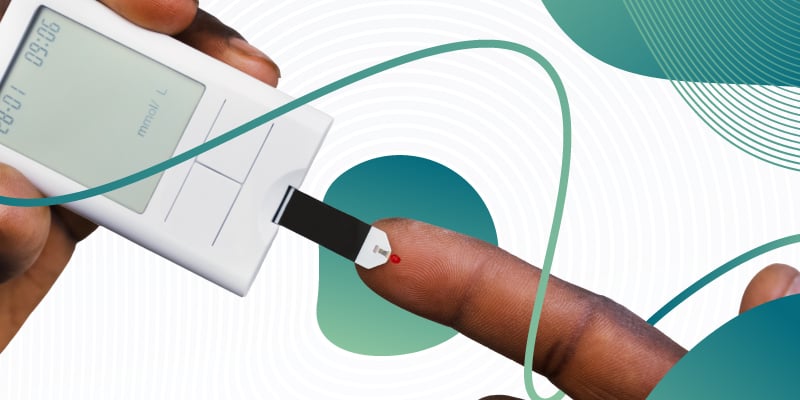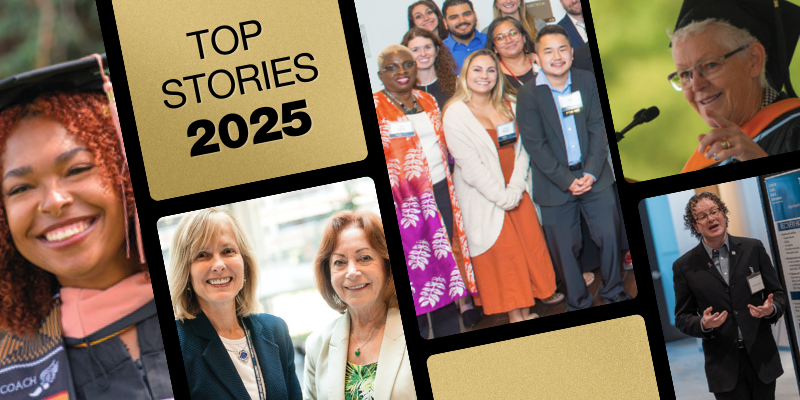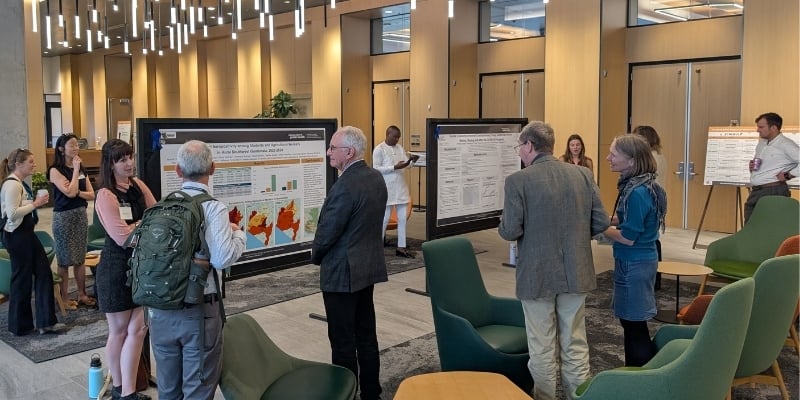Members of the National Caucus of Native American State Legislators visited the Centers for American Indian and Alaska Native Health (CAIANH) in November to learn about the CAIANH’s work to better understand the health of Native peoples across the United States, to advance culturally oriented and community-driven solutions, and how this work has helped shape public policy.
The National Caucus of Native American State Legislators (NCNASL) is a bi-partisan group of 89 state legislators from 20 states, and they were eager to learn more about CAIANH, which in located the Colorado School of Public Health (ColoradoSPH) on campus, its projects and research, and to tour the Center in an effort to consider ways they can support similar work in their states. The visit was organized by Jenn Russell, MHA (Choctaw Nation of Oklahoma), a research instructor in CAIANH, and Nicole Reed, MPH (Choctaw Nation of Oklahoma), senior professional research assistant and DrPH candidate in ColoradoSPH. The visit coincided with the group’s attendance at their annual meeting in Denver.
“This meeting was a welcomed opportunity,” Reed said. “For so many of us, we came into this field because we want to help and give back to tribal communities, and we understand the data we collect has real life implications and represents real people. The connections built during this meeting were grounded within this foundation.”
More than 10 American Indian, Alaska Native, and Native Hawaiian state representatives and senators attended from states including Alaska, Arizona, Hawai'i, Oklahoma, Oregon, Maine, Minnesota, New Mexico, North Dakota, South Dakota, and Washington. One of the state legislators who attended, Benny Shendo Jr. (Jemez Pueblo Tribe), already had a connection with the University of Colorado. In October, Shendo was appointed Associate Vice Chancellor for Native American Affairs at CU Boulder, a newly created role where he will act as a liaison between the CU Boulder campus and tribal communities across Colorado.
Attendees of the event gathered in the Nighthorse Campbell Native Health Building (NCNHB) on the CU Anschutz Medical Campus, named for Ben Nighthorse Campbell (Northern Cheyenne), a former Native American state legislator himself who went on to become a U.S. House Representative and U.S. Senator.
In his welcome address, Manson highlighted formative research conducted at CAIANH that has positively impacted the health of Native people and that drove policies of continued investment and expansion of programs across Indian Country. This included CAIANH’s role in the success of the Special Diabetes Program for Indians, an Indian Health Service program that addresses the epidemic of diabetes among Native peoples. Because of its proven effectiveness in reducing rates of diabetes among American Indians and Alaska Natives, the U.S. Congress has continuously funded the program since its inception in 1997.
CAIANH faculty emphasized the role of research in affecting policy as they presented current research with American Indians and Alaska Natives. CU Anschutz and ColoradoSPH faculty including Angela Brega, PhD, Jerreed Ivanich, PhD (Tsimshian, Metlakatla Indian Community), Joan O’Connell, PhD, Michelle Sarche, PhD (Lac Courte Oreilles Ojibwe), Jay Shore, MD, and Nancy Whitesell, PhD participated in a panel and shared examples of their important research with Native communities on maternal and child health, diabetes prevention and treatment, telehealth, Medicaid reimbursement, suicide prevention in tribal communities, and more.
During the panel discussion, the NCNASL group was particularly interested in how research outcomes, including the work at CAIANH, can be disseminated in order to positively impact their constituents. They asked questions around how we can collectively create a positive narrative on how data collected from Native communities can help influence policy and create funding mechanisms to meet tribal and Native community needs, despite historical misuse and mistrust. The group also asked about efforts to encourage future Indigenous investigators, researchers, and clinicians.
The open dialogue between panelists and attendees created a great opportunity for learning, sharing, and connection about the collective effort to support the health and well-being of Indigenous people.
At the completion of the event, Sarche, ColoradoSPH professor of community and behavioral health and at CAIANH, commented, “Seeing all those smiling faces is a testament to the love we all share for the work that we do, from our respective positions, to support the health, well-being, and thriving of Native communities.” She also noted that the event was fruitful. “I think seeds were planted for future connections and collaboration.”
Jenn Russell also noted the enjoyment of having the legislators visit. “I am excited we had the opportunity to share the beauty of the Nighthorse Campbell Native Health Building and the Anschutz Medical Campus with them, as well as the wonderful work our faculty and staff do at CAIANH. It was an honor to host this esteemed group who have a shared interest in the health and well-being of our Native people.”
CU Anschutz
Fitzsimons Building
13001 East 17th Place
3rd Floor
Mail Stop B119
Aurora, CO 80045



-Nov-30-2023-02-28-05-4076-PM.jpg)


